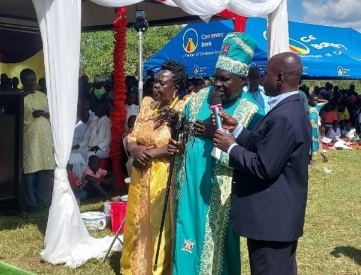By Eumu Emmanuel
Soroti District – The head of the Kumam Cultural Institution, Won Ateker Raphael Otaya, has made a strong appeal for unity between the Kumam and Iteso communities, urging his people to reject the divisive politics of sectarianism and ethnicity. Speaking during Katine Catholic Parish Day, Otaya emphasized that tribal-based politics has no place in modern society and should be set aside.
Otaya, a long-time advocate of regional harmony, warned against voting for leaders who promote division along ethnic lines. “We must categorically reject politics that divide us on sectarian or ethnic grounds,” he said. “Those who promote such backward thinking should not be given a mandate to lead. They only weaken us as a people and as a region.”
As the Kumam leader, Otaya is committed to strengthening cooperation between the Kumam and Iteso communities, which share a rich history and cultural ties. He questioned the reasons for political divisions being drawn along tribal lines, asking why such differences should even exist. “We are one people with common goals and aspirations,” Otaya declared. “Why should we allow ourselves to be divided by arbitrary lines drawn by those who seek to benefit from our disunity?”
Otaya further emphasized that the region’s potential for development and prosperity depends on unity and collaboration. “The Kumam and Iteso must recognize that our future is intertwined,” he said. “We will only thrive if we stand together. Our strength lies in our unity.”
The cultural leader’s remarks come at a crucial time, as various political figures in the region gear up for elections, some of whom have been accused of fueling ethnic divisions to gain political advantage. Otaya’s address seemed to respond directly to these developments, warning of the dangers of tribal-based politics, which he believes hinder progress. “We should focus on electing leaders who prioritize development, education, and health for all our people, regardless of tribe,” Otaya stressed. “Division weakens us and delays the progress we so desperately need. We should hold our leaders accountable for uniting us, not dividing us.”
Otaya’s call for unity extended beyond politics, highlighting the need for social and economic growth. He pointed out that a united front between the Kumam and Iteso communities would strengthen cooperation in areas such as trade, infrastructure development, and education. “By working together, we can uplift one another and ensure a brighter future for our children,” he said. “Disunity only creates barriers to progress and perpetuates a cycle of poverty and underdevelopment.”
The Kumam and Iteso people, with their longstanding cultural ties, should use these bonds as a foundation for greater unity, both now and in the future, Otaya argued. He called on both communities to embrace their shared heritage and collaborate for the common good. “We have more that unites us than divides us,” he noted. “Our ancestors lived and thrived together, and so can we.”
In his closing remarks, the Kumam leader reiterated his commitment to fostering peace and unity among the people of the region. He expressed optimism that, with collective effort, the Kumam and Iteso communities can overcome the challenges of tribalism and build a prosperous future. “Let us all strive to be agents of change,” Otaya urged. “Together, we can achieve greatness.”


